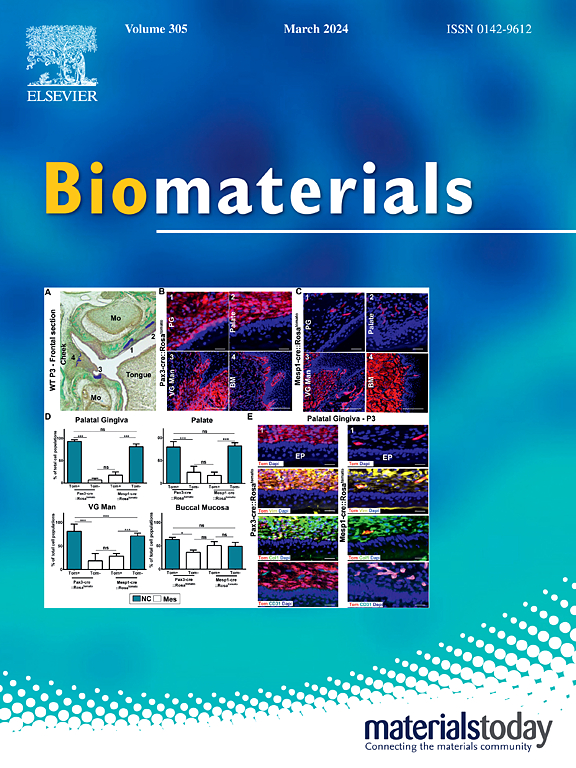BCL-2/xL抑制剂白蛋白纳米复合物降低血小板毒性,提高骨髓增殖性肿瘤和淋巴瘤的抗癌效果
IF 12.8
1区 医学
Q1 ENGINEERING, BIOMEDICAL
引用次数: 0
摘要
BCL-2/xL抑制剂在癌症治疗中的临床应用受到靶向血小板减少症的限制。虽然APG-1252旨在缓解这一问题,但在临床试验中,高剂量的血小板毒性限制了剂量的增加以获得更大的疗效。我们开发了APG-1252的白蛋白纳米复合物(Nano-1252),通过增强淋巴器官的药物传递来降低血小板毒性,同时提高药物疗效。由于APG-1252与白蛋白之间的强结合亲和力,纳米-1252形成稳定的纳米颗粒,通过限制药物在循环中过早释放和转化为活性形式,将血小板毒性阈值降低了四倍。此外,纳米-1252在淋巴器官中表现出优先积累,从而增强了套细胞淋巴瘤(MCL)和骨髓增生性肿瘤(mpn)小鼠模型的抗癌功效。我们的研究不仅开发了一种潜在的配方来克服目前APG-1252的翻译障碍,而且揭示了已经建立的白蛋白纳米配方的新特性,从而扩大了其临床应用。本文章由计算机程序翻译,如有差异,请以英文原文为准。
Albumin nanocomplex of BCL-2/xL inhibitor reduced platelet toxicity and improved anticancer efficacy in myeloproliferative neoplasm and lymphoma
The clinical application of BCL-2/xL inhibitors for cancer treatment is limited by the on-target thrombocytopenia. Although APG-1252 was designed to mitigate this issue, platelet toxicity at higher doses in clinical trials restricts dose escalation for greater efficacy. We have developed albumin nanocomplexes of APG-1252 (Nano-1252) to reduce platelet toxicity while improving drug efficacy through enhancing drug delivery to lymphoid organs. Nano-1252 forms stable nanoparticles due to the strong binding affinity between APG-1252 and albumin, reducing the platelet toxicity threshold by fourfold by limiting premature drug release and conversion to its active forms in circulation. Furthermore, Nano-1252 exhibited preferential accumulation in lymphoid organs, leading to enhanced anticancer efficacy in Mantle Cell Lymphoma (MCL) and Myeloproliferative Neoplasms (MPNs) mouse models. Our study not only develops a potential formulation to overcome the current translational barrier of APG-1252 but also reveals novel properties of the well-established albumin nanoformulation, thereby expanding its clinical applications.
求助全文
通过发布文献求助,成功后即可免费获取论文全文。
去求助
来源期刊

Biomaterials
工程技术-材料科学:生物材料
CiteScore
26.00
自引率
2.90%
发文量
565
审稿时长
46 days
期刊介绍:
Biomaterials is an international journal covering the science and clinical application of biomaterials. A biomaterial is now defined as a substance that has been engineered to take a form which, alone or as part of a complex system, is used to direct, by control of interactions with components of living systems, the course of any therapeutic or diagnostic procedure. It is the aim of the journal to provide a peer-reviewed forum for the publication of original papers and authoritative review and opinion papers dealing with the most important issues facing the use of biomaterials in clinical practice. The scope of the journal covers the wide range of physical, biological and chemical sciences that underpin the design of biomaterials and the clinical disciplines in which they are used. These sciences include polymer synthesis and characterization, drug and gene vector design, the biology of the host response, immunology and toxicology and self assembly at the nanoscale. Clinical applications include the therapies of medical technology and regenerative medicine in all clinical disciplines, and diagnostic systems that reply on innovative contrast and sensing agents. The journal is relevant to areas such as cancer diagnosis and therapy, implantable devices, drug delivery systems, gene vectors, bionanotechnology and tissue engineering.
 求助内容:
求助内容: 应助结果提醒方式:
应助结果提醒方式:


